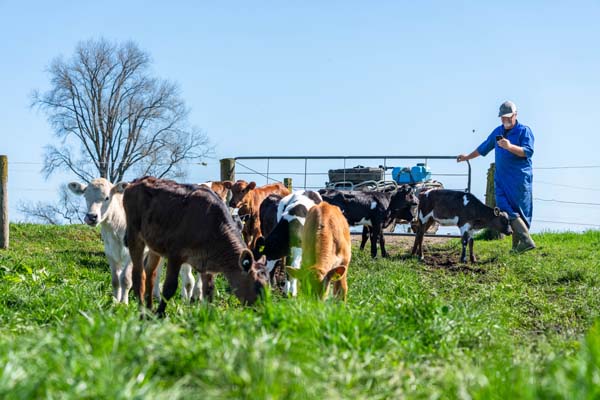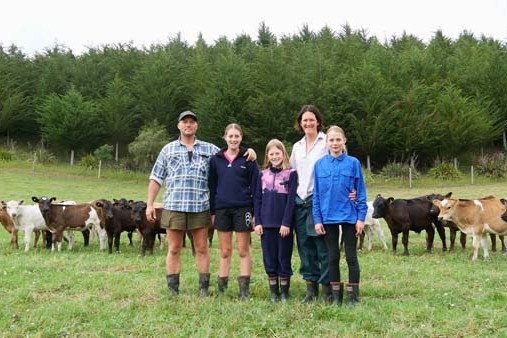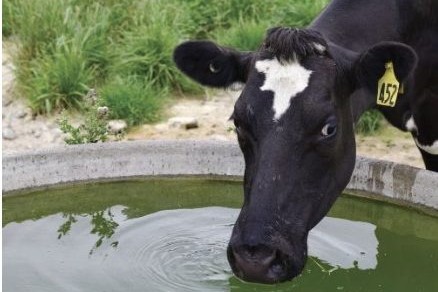Behind the show cows, historic breeding lines and Royal family connections, the Fergusons are first and foremost dairy farmers. Sheryl Brown reports.
Warren and Michelle Ferguson have downsized in the last couple of years, having finished leasing the neighbouring farm, and are now milking 230 cows on their farm 10 minutes north of Otorohanga.
They have lived and worked on the Ferguson family farm for the last 35 years, buying the farm off Warren’s parents Don and June Ferguson in 2002.
The farm is mostly flat, running down to the banks of the Waipa River, with a few mowable hills dotted around. It’s a wet farm and it can get dry quickly in the Waikato summers, Warren says.
The couple have planted 11.5 hectares of chicory for the first time this season as a way to get more summer feed. It’s been a hit with the cows and they’re already planning on planting it again.
The farm is shaped in a dog leg and the cows’ longest walk is 2.5km back to the farm dairy – that’s why all the cows have to be healthy and functional – they’re not just show cows, Warren says.
“We are still farmers like everyone else,” Warren says.
Show cows often get stigmatised by the dairy industry for not being good milk producers, he says. That may have been the case in the past, but today you wouldn’t consider taking a cow to a show unless she was an excellent producer.
“We are not trying to breed a show cow – we are trying to get the best cow and it’s a bonus if we can show her.
“She has to be a functional cow – because the longer she lives she’s going to produce more.”
The family has strong roots and a reputation for breeding award-winning cows. Warren’s father Don established Ferdon Stud (Fer – Ferguson and don – Don) in 1949.
The Jersey stud, in its 70th year, still has cow families that link back to Don’s original half a dozen cows, including ones that connect back to the Channel Island of Jersey, where the breed originates.
Some of the cows are still co-owned by Queen Elizabeth II, who donates her income from the cows into sponsorship funding to help up-and-coming breeders in New Zealand.
Don’s partnership with the Queen began after he and his wife June travelled to the Royal Show at Stoneleigh Park in 1974 where some of the Queen’s cows were being exhibited. Don, whose life was Jersey cows, shared some unimpressed comments about the cows which led to Don and June being invited to meet the Queen in NZ in 1977 and present some of their Ferdon cows to the Queen.
The meeting sparked a 40-year friendship between the Don and the Queen and a partnership in cow ownership.
The pair used to talk about cows, family and kids on their phone calls. The Queen also visited the Fergusons’ farm on her visit to NZ during the 1990 Commonwealth Games.
When Don died in February 2017, the Queen wrote June a private note of sympathy.
The Queen still owns eight of the cows in the herd, and Warren has taken up the mantle of reporting back to the Queen on their progress.
Genetics are in the genes
Warren, one of Don and June’s six children, left school at 15 when his parents went overseas on holiday and left him in charge of the farm.
“Mum and dad were going away and I was expected to do both (go to school and milk the cows), but I just left school – it was a good excuse.”
Warren held a passion for dairy cows from a young age and he and Michelle’s sons all have a passion for cows as well. Their three sons, Joshua, Corey and Ashley pitch in to help when it comes to preparing cows for shows.
Corey is contract milking on the neighbour’s farm and wants to buy into the family herd on his path to sharemilking and possibly farm succession.
It was a quiet year for the Ferguson family in 2019 with Mycoplasma bovis putting a stop to most of the dairy show events around the country.
Preparing the cows and taking them to shows is a family tradition and is often the occasion for getting the family together, Michelle says.
“Our family and close friends help us every year. We missed it last year, we missed everyone together. It’s the first year I haven’t tied up calves to get them ready for calf club or shows.”
The competitiveness when it comes to picking and showing cows runs strong in the family and usually makes for some good entertainment.
“There is plenty of fights and competition.”
Everyone has a different opinion on which cows to show. It used to be the same between himself and Don, Warren says.
“Dad would like one cow and I’d like another one, so he would take his to the show and I’d take mine and we would try to beat each other.”
It’s great to have the kids and grandkids involved and sharing a passion for the cows, he says. Corey’s daughter Maddison, 6, entered her calf club heifer in the Royal Easter Show in 2017 beating Warren for Junior Champion Jersey.
Corey went building for six years after school before moving back to the home farm to work.
He has also trained to be a fitter and travels overseas to clip cows for other breeders at dairy events. He travelled to 10 shows last year, in Australia, Canada and the United States as a fitter or to help on the stands of some of the semen companies.
Clipping cows is an art – it’s just like finding a good barber, Corey says.
“You make the most of the cow – you’re highlighting the good bits.
“You can earn up to $400/day, and your flights and accommodation are paid for.”
The perfect cow
The Ferdon herd still has family lines connecting back to Don’s original cows, but when Warren and Michelle bought the farm (and herd), they branched out a little. They extended the branches of the family lines within the herd. They mostly look across to American and Canadian genetics – whatever is hot now, Corey says.
They also started breeding Holstein Friesians 20 years ago when Joshua showed some interest in the black and white cows, and the odd Ayrshire.
They paid top money for a Holstein Friesian calf recently. The boys all have a share in her, which helps keep them interested, Warren says.
“We bought her for her family line, she’s well bred. It doesn’t matter what colour the cows are, it’s the animals.”
Warren is a national judge and has travelled to the Australia International Dairy Week to judge.
When it comes to selecting the best cows out of a line-up it’s a natural in-built talent, he says.
“You’ve got to have an eye for it. You’ve either got it or you don’t.”
A good cow must have the right balance, Warren says.
The magic of genetics is you can make the decisions and breed the animals to what you think is the best match, but you can never guarantee the result.
“When you think you have the perfect cow, you’ve finished.”
One of the best cows Warren and Michelle have bred is Ferdon Comerica Viyella, who has just retired from shows. Viyella goes back 19 generations to Lady Viola who came from Jersey and went to England then America. The rising 10-year-old has won every title she could have won. She won junior and intermediate Jersey five times.
Only two Jersey cows have won the Supreme Championship All Breeds Award at the NZ Dairy Event – Viyella is one of those two cows and she won it three times.
“She’s a freak, she has the most amazing nature. She’s world-known,” Warren says.
They have three live daughters out of Viyella and could potentially look to flush her to sell embryos.
They have dabbled in flushing some of their top cows, but the NZ Jersey stud market is quite small and it’s expensive to export semen or fertilised eggs. In the United States they’d be flushing all the time because there is a strong market.
“I’ve often said Warren is in the wrong country, for his cows,” Michelle says.
NZ sits at the bottom of the world and it’s always more expensive to trade in genetics. Like any farm working cost, the end must justify the means, Warren says.
“It’s got to pay for itself.”
Warren and Corey do all the artificial insemination for the herd. The Jersey straws they buy average between $20 and $30 and the Holstein Friesians average $60/straw.
They use tail paint to identify cows on heat, but Warren is usually keeping a close eye on the cows during mating.
The herd has a -14 Breeding Worth, but one of their top cows produced 7500 litres of milk and 800kg milksolids (MS) last season, with a 6.98 fat test.
It would be great to get the cows milking to their capacity, but that will require a lot of capital expenditure to increase the farm system intensity, Warren says.
“We have cows that could be producing a lot more, but we would need a different system to do that. It’s got to pay for itself.”
The family make a significant income from stock sales every year. They sell a small portion of heifer calves and sell Jersey and Friesian bulls at weaning. They also sell yearlings or R2s or cows depending on their replacement needs.
They typically keep a handful of bulls to sell later and use over their yearlings. Their best sale was a $25,000 yearling bull in 1985 – they still haven’t topped that.
Future shows
Dairy events and sales in NZ are a far cry from what they used to be when he was growing up, Warren says.
In the 1970s and 80s half of the cows from their sale would go to Australia, but that can’t happen any more. Warren took the first lot of Don’s heifers across to Windsor on a plane in 1977.
Warren and Michelle hope the M. bovis situation will clear soon to make It easier for the dairy events in NZ to continue.
“The shows are nothing like the golden years. When I was a kid the Waikato show had 20-30 animals in each class – now you’re lucky to get that many cows at the whole event.”
For now Warren and Michelle are happy onfarm and there is no place they’d rather be.
Warren has yet to travel to the US and Canada and visit stud farms there and Michelle hasn’t visited Jersey so the bucket list needs to be ticked off.
- The Fergusons will feature in an upcoming programme ‘Making NZ’ on PrimeTV later this year.
FARM FACTS
• Farm: Ferdon Genetics
• Owners: Warren and Michelle Ferguson
• Location: Otorohanga, Waikato
• Area: 85ha effective
• Cows: 230, (170 Jerseys, 60 Holstein Friesians and Ayrshires)
• Production: 400kg MS/cow
• Farm Dairy: 24-aside herringbone
• DairyNZ Farm System 3: Spring calving
• Supplement: 11.5ha chicory, 0.5t palm kernel/cow/year
• Farm working costs: $2.85/kg MS
• Stock sales: $1.25/kg MS




